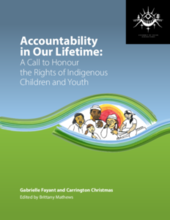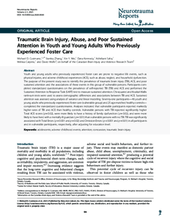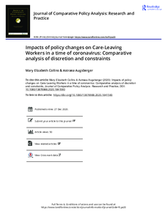Displaying 81 - 90 of 345
"Months before British Columbia officially ended the controversial practice of birth alerts, government lawyers advised the Ministry of Children and Family Development (MCFD) that the practice was 'illegal and unconstitutional' and posed a 'litigation risk,' according to records obtained by IndigiNews," says this article.
This research examines the intersection of cross-cultural practice and child maltreatment investigations.
"As the COVID-19 pandemic surges into its second year, advocates and experts say children with special needs and their families are seeing some of the toughest impacts," says this article from Global News.
This article combines insights from Beck’s individualization theory and Crenshaw’s intersectionality theory to enhance understandings of why youth transitioning out of the child welfare system experience risk of poor outcomes.
For decades, First Nations have called for Canada to respect the sacredness of their children and youth by upholding the best interests of the child, substantive equality and cultural continuity. This call has been echoed in numerous reports including, but not limited to, the Royal Commission on Aboriginal Peoples (1996), the Joint National Policy Review (2000), the Wen: De Reports (2005), the Truth and Reconciliation Commission (2005), A Roadmap to the Truth and Reconciliation Commission Call to Action #66 (2018) and the National Inquiry into Missing and Murdered Indigenous Women and Girls (2019). In June 2020, Bill S-217 (now S-210) was introduced by Senator Rosemary Moodie for the creation of an Office of the Commissioner for Children and Youth in Canada. The Bill proposes the establishment of an appointed Commissioner for Children and Youth to promote, monitor and report on
the implementation of Canada’s obligations under the United Nations Convention on the Rights of the Child.
The purpose of the present study was to identify the prevalence of traumatic brain injury (TBI), adverse childhood experiences (ACE), and poor sustained attention and the associations of these events in youth and young adults who previously experienced foster care.
This study sought to validate the Early TRAuma-related Disorders Questionnaire (ETRADQ), a caregiver report which was developed to assess attachment disorders in school-age children based on the Diagnostic and Statistical Manual of Mental Disorders–Fifth edition criteria.
This policy analysis examines the impact of COVID-19 policy guidance on the role of workers who provide outreach to transition-age care leavers.
In this video from BBC News, survivors of the "Sixties Scoop" - in which indigenous children in Canada were forcibly removed from their families - are mapping out their stories and finding solace in connecting with others.
This study examines whether increased interaction and observation of young children by school professionals leads to an increase in school-based reports to child welfare authorities and in the identification of child maltreatment victims.



